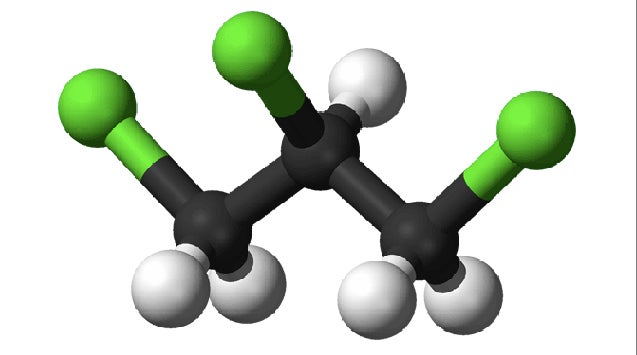Drinking water panel to renew call for NJ to regulate 1,2,3-TCP

A molecule of 1,2,3-TCP, which is known to cause cancer in humans.
A scientific panel that recommends safe drinking-water standards will issue a new recommendation on the regulation of a carcinogenic chemical in coming months. That measure is likely to be adopted by New Jersey officials, the panel’s chairman said on Wednesday.
Dr. Keith Cooper, chairman of the Drinking Water Quality Institute, said the body is gathering new evidence on the occurrence, treatment, and health effects of 1,2,3-TCP, a chemical that may cause cancer in humans, after first recommending a safety limit for its presence in drinking water in 2009.
Speaking after the latest meeting of the DWQI in Lawrenceville, Cooper called the institute’s work on the chemical “unfinished business” after it recommended a limit that was not adopted by the Department of Environmental Protection six and a half years ago.
Cooper said he did not know why the DEP didn’t act on the panel’s recommendation at the time, but predicted that officials will accept it this time because of strong evidence of the chemical’s threat to public water supplies. He said the new investigation was recently requested by DEP Commissioner Bob Martin following an independent decision by the DWQI to reopen the probe.
DEP officials could not immediately be reached to comment on why the department did not accept the DWQI’s earlier recommendation.
Cooper, a Rutgers University toxicologist, said he was involved in the 2009 research, although was not part of the DWQI at the time, and was concerned about the toxicity of the chemical.
“This compound I considered as one of the most potent carcinogens I had seen,” he told NJ Spotlight. “It makes a lot of sense to go through and reexamine this compound.”
Cooper predicted that the DWQI will recommend a new “maximum contaminant limit” (MCL) for the chemical within a “few months,” after reviewing its previous research and adding any new evidence, which can be submitted to DEP by the public until mid-October. He said it was too early to say whether the new recommendation would be the same as the recommended 2009 standard of 0.03 parts per billion.
The U.S. EPA classifies TCP as a “likely carcinogen” but has not set a MCL at the federal level.
The investigation has not been prompted by any new information on the chemical but by the continuing need to set a formal safety limit on its presence in drinking water so that it can be regulated by the state, Cooper said. “This is just a bad actor and we need to set a MCL for it,” he said.
Gloria Post, a DEP scientist, told the DWQI meeting that tests on rats and mice showed that TCP was carcinogenic. She called it “the most potent chemical evaluated” by the panel in its history, and noted that another study by the U.S. Environmental Protection Agency, also in 2009, came to very similar conclusions.
“There was clear evidence of carcinogeity in rats and mice, and there was more early death as the dose increased,” she said. Tumors found in the laboratory animals are considered “relevant to humans”, she said. Post said the chemical is particularly dangerous for children under the age of two.
The chemical, used in pesticides, degreasers, and varnish removers, is also targeted by the state legislature, which in June passed a bill directing the DWQI to set a drinking water limit that would be adopted by the DEP within 180 days. The bill,A3954, is awaiting a decision by Gov. Chris Christie.
TCP was found in two now-shuttered wells in Moorestown, Burlington County, which is represented by two of the bill’s cosponsors, Assemblymen Herb Conaway and Troy Singleton.
Cooper acknowledged that the legislation gives his panel the discretion to set a limit — rather than complying with a standard set by lawmakers — but said the legislature should leave such matters to scientists.
“The New Jersey DEP, within the drinking water statutes, is really who should be setting the drinking-water standards,” he said.
Asked whether the DWQI would speed up its work if Christie signs the bill, Cooper said the panel has limited resources in that its members all have other jobs, and that it has a “huge” backlog” of work.
Tracy Carluccio, deputy director of the environmental group Delaware Riverkeeper Network, welcomed the new investigation into TCP, as well as the legislation, as signs that the chemical will finally be regulated after the DEP’s decision not to do so in 2009.
“DEP could have acted back then but sat on their hands, and it took this legislation and public attention to get the regulation of TCP back on the radar,” she said. “It must be acted on right away to protect people from further exposure in their drinking water.”
Meanwhile, the DEP is evaluating DWQI’s recommendation in July that the state agency should set a maximum contaminant limit for PFNA, a toxic chemical that has been found in especially high concentrations in the south Jersey town of Paulsboro.
Sandra Krietzman, chief of the DEP’s Bureau of Safe Drinking Water, said she was unaware of any timetable for a decision on that recommendation, the DWQI’s first since resuming work in 2014 after a four-year hiatus.
___________________________________________________
NJ Spotlight, an independent online news service on issues critical to New Jersey, makes its in-depth reporting available to NewsWorks.
WHYY is your source for fact-based, in-depth journalism and information. As a nonprofit organization, we rely on financial support from readers like you. Please give today.




